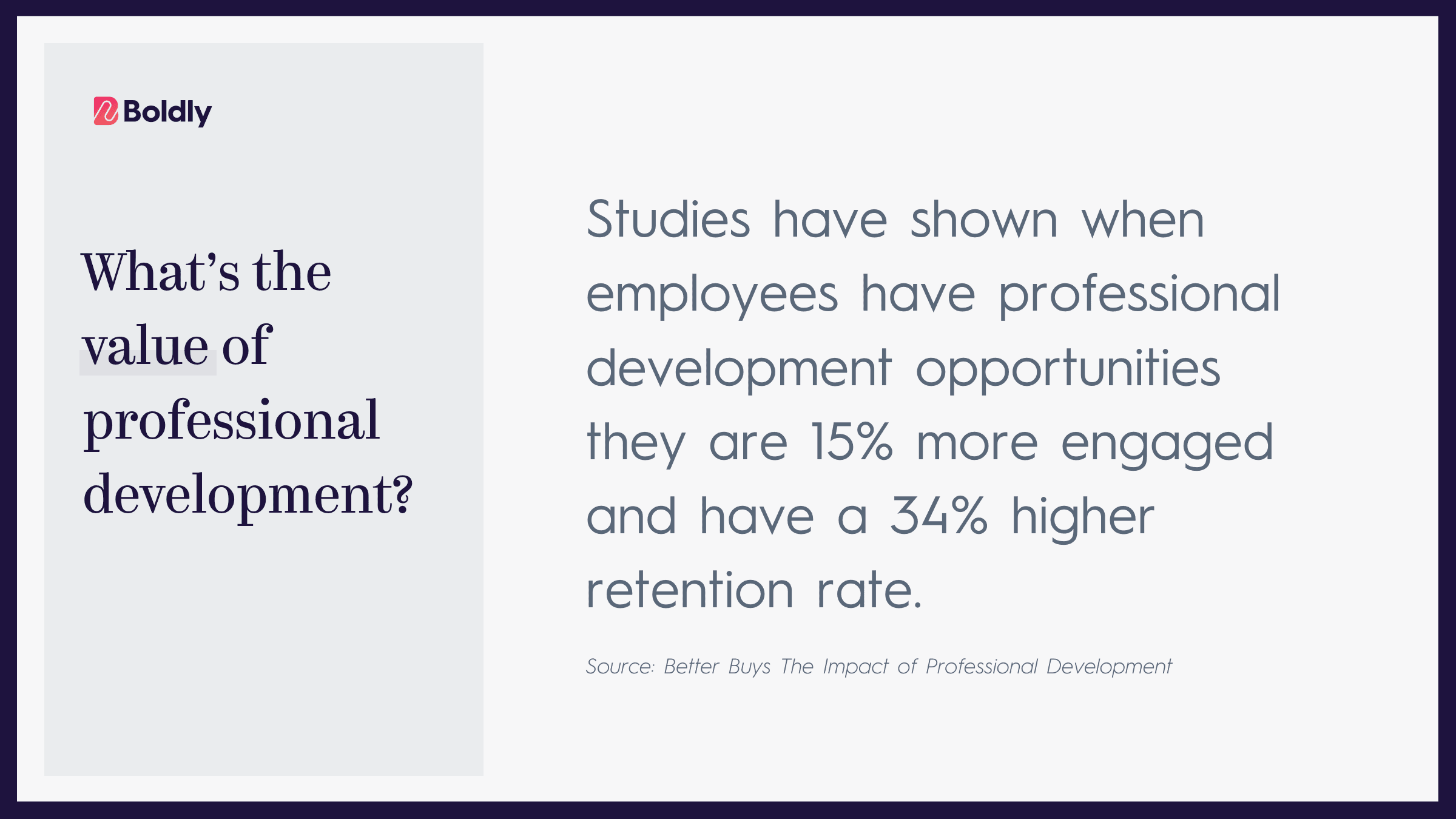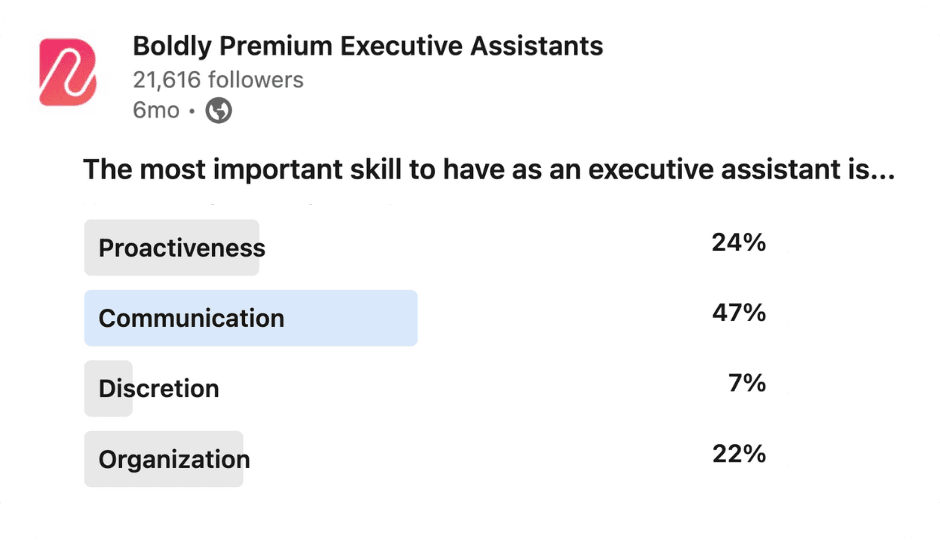The best executive assistants always seek to improve. They look for better processes, new efficiencies, and ways to streamline their work.
However, they often don’t have the chance to apply these skills to their own careers.
As the go-to person for your busy schedule, it’s easy to overlook professional development for your executive assistant. After all, they’re just as busy as you are!
But what if training is exactly what your EA needs to make the most of their time—and, in turn, help you to be more productive as a leader?
Even if you’re working with a limited budget or bandwidth, there are plenty of options out there for executive assistant professional development.
We’ve compiled a list to help you get started. We also encourage you and your EA to think beyond typical administrative training. Consider exploring topics like leadership, persuasive writing, AI prompting, or people management. Choose what suits your assistant’s job, interests, and career goals.
Here’s what we’ll cover in this article:
The Value Of Professional Development
Conferences, Events, & Networking For Executive Assistants
Executive Assistant Training & Certifications
Recommended Books & Podcasts For Executive Assistants
Executive Assistant Professionals & Influencers
Choosing The Right Professional Development Opportunity For Your Executive Assistant
What’s The Cost Of Professional Development?
What Is The Value Of Professional Development?
Professional development seems like a vague option for busy teams. The time and expense don’t always translate into an immediate return on investment.


Consider this: one study showed that employees with professional development opportunities are 15% more engaged and had a 34% higher retention rate. Employees who are happier, more engaged, and willing to stick around begin to boost your bottom line — and that’s just the start.
Professional development opportunities:
- Improve job performance and confidence. The natural outcome of developing skills is better job performance and confidence. That improvement boosts credibility with other team members and clients.
- Keep employees current with the industry. Technology and trends are constantly changing. Professional development, through training from trustworthy sources, helps employees stay ahead of that.
- Provides networking opportunities. Workshops, training sessions, and conferences are great ways to connect with mentors or others whose collaboration will provide value long after the event. Networks are where clients, team members, and feedback come from. Also, professional development helps your team practice networking, an important skill on its own.
- Maintains a positive atmosphere. Allowing and encouraging professional development helps with recruitment, retention, and morale. There’s a sense that human capital is prioritized.
That’s a short list for something so important.
But understanding the value before discussing the costs or intricacies of professional development is necessary for something with so much organizational benefit. According to a Hubspot survey, providing professional development positively impacts retention, recruitment, and onboarding times.
Professional Development For Your Executive Assistant
The vast skillset and multifaceted nature of the executive assistant role means there are a lot of options for professional development.
While knowing what hard skills your executive assistant needs regular training on is easy, the soft skills are more complex. How do you equip your executive assistant with networking skills? How do you open opportunities to connect with existing and prospective clients?


When we asked Boldly’s LinkedIn community of executive assistants what they considered the most important skill for an EA, almost half said communication.
Training geared specifically for executive assistants is helpful. It comes in many forms.
Conferences, Events, & Networking For Executive Assistants
These types of events are the classic professional development options — they’re a great way to learn new skills, network with fellow administrative professionals, and come away refreshed and inspired.
However, conferences and events for executive assistants are often expensive. You’ll need to carefully consider the pros and cons of sending your assistant in person. High-cost events provide advanced training and exclusive networking opportunities. For early-career assistants, foundational content and flexible learning formats may be more suitable, while seasoned professionals can gain from specialized training and ongoing development.
Administrative Professionals Conference
- What is it? A top global event for administrative professionals. It offers training and networking as well as general and advanced sessions on leadership, project management, and new trends.
- Who should attend? Administrative professionals, executive assistants, and office managers from corporations, academia, and government agencies. Participants range from entry-level to experienced professionals.
- Cost: Starts at $1,850 (members), $2,150 (non-members)
- Notable review: “This was my 4th time attending, and each time, I learn something new to implement. It gives a great boost to your morale for our profession.”
- What is it? An annual conference hosted by the International Association of Administrative Professionals (IAAP). This event is perfect for those seeking CAP credits and better leadership skills. The hybrid model is perfect for professionals with busy schedules. It offers great flexibility in attendance.
- Who should attend? Admin professionals, executive assistants, office managers, and IAAP members, particularly those seeking professional growth and leadership development.
- Cost: Starts at $999 (in-person, members); $499 (virtual).
- Notable Review: “The sessions were very informative, and the networking opportunities were fantastic. I felt more prepared to lead and support my team.”
Office Dynamics International‘s Conference for Administrative Excellence
- What is it? High-level event for administrative professionals offering training to enhance skills, improve productivity, and foster leadership growth. The event is known for its focus on personal and professional development, with sessions led by top industry experts.
- Who should attend? Experienced executive and administrative assistants, office managers, and other administrative professionals from large corporations and small businesses.
- Cost: Starts around $1,795 (early bird)
- Notable review: “Being in a collective space with like-minded professionals dedicated to elevating admin skills was truly inspiring.”
- What is it? Exclusive, high-level training event designed for senior executive assistants.
- Who should attend? Senior-level assistants who support C-suite executives, particularly those seeking to deepen their strategic influence within their organizations.
- Cost: Starts at $2,095.
- Notable review: “Each session was incredibly informative, engaging, and ‘meaty’ enough for me to make enhancements that will propel me forward for my organization and personal development.”
American Society of Administrative Professionals (ASAP)
- What is it? ASAP is dedicated to advancing the careers of administrative and executive assistants. They provide training resources, professional certifications, and host events such as the Administrative Professionals Conference (APC) and EA Ignite, both designed to build skills and foster networking among administrative professionals.
- Who should join? Administrative professionals, including executive assistants, administrative managers, and office coordinators.
- Cost: Membership is free, professional membership, which offers additional webinars, downloads, and reports, starts at $199 per year.
- What is it? Professional membership community offering ongoing training, networking, and development for executive assistants.
- Who should join?: Executive assistants and administrative professionals who work closely with C-suite executives, as well as administrative assistants looking to enhance their career paths.
- Cost: Starts at $500/month or $5,400/year (plus $500 sign-up fee) for executive assistants, $300/month or $3,240/year (plus $300 sign-up fee) for administrative assistants.
- Notable review: “LUMINI has transformed the way I work with my executive. The peer group learning sessions are invaluable, and the tools provided are incredibly practical.”
State of the Executive Assistant
- What is it? Facebook group is designed for executive assistants and those in related roles, providing a platform for networking, sharing insights, and supporting each other in professional development.
- Who should join? The group is open to all executive assistants, regardless of experience level. The group currently has nearly 20,000 members.
- Cost: Free
Training & Certifications For Executive Assistants
Do formal certifications for executive assistants matter anymore?
Some professionals still appreciate traditional certifications for the knowledge and confidence they can bring, particularly in specialized areas like project management or advanced software tools.
However, practical experience and on-the-job training often hold greater significance in day-to-day operations. As the role of administrative professionals becomes increasingly dynamic, soft skills such as adaptability, communication, and problem-solving may be just as critical, if not more so, than formal certifications.
There are a growing number of niche certifications (for example, a Chief of Staff certification below) or trainings on Microsoft Office tools, AI platforms, and more that may offer more day-to-day value.
Administrative Office Professional (AOP) Program
- What is it? A traditional comprehensive certification program covering essential office skills and technologies offered by institutions and colleges.
- Who should take it? Entry-level administrative professionals or those seeking to enhance their skills.
- Cost: Ranges from $1,000 to $3,000, varying by institution.
- Time required: Usually 6 to 12 months to complete, depending on whether studying full-time or part-time.
Certification for Administrative Professionals (CAP)
- What is it? Certification offered by the International Association of Administrative Professionals (IAAP) that validates and builds administrative skills.
- Who should take it? Experienced administrative professionals looking to add credentials to their resume.
- Cost: $375 for IAAP members and $575 for non-members (exam fee only).
- Time required: 3-hour exam, with studying and preparation time varying by individual.
Professional Administrative Certification of Excellence (PACE)
- What is it? Online certification program offered by the American Society of Administrative Professionals (ASAP) focusing on administrative excellence.
- Who should take it? Administrative professionals at all levels.
- Cost: $375 for ASAP members and $425 for non-members.
- Time required: 90-minute exam, with up to one year allowed to prepare and take the test.
- What is it? An in-person certification program focusing on high-level executive assistant skills. This is often part of the Office Dynamics Annual Conference
- Who should take it? Experienced executive assistants looking to advance their careers or work with C-suite executives.
- Cost: Starts at $695
- Time required: One day
Productivity and Time Management by Practically Perfect PA
- What is it? An online course that emphasizes productivity and time management skills tailored for assistants.
- Who should take it? Administrative professionals looking to improve their efficiency.
- Cost: $330
- Time required: The course contains 8 modules with over 10 hours of video content. Practically Perfect PA recommends that students study a module per week and complete the course over 8 weeks.
The Leveled-Up Assistant Program
- What is it? A new program by The Whole Assistant that includes live coaching, community support, and access to exclusive resources to foster continuous learning and networking. This program is ideal for those looking to elevate their effectiveness and impact in their roles.
- Who should take it? Executive assistants looking to transition into higher-level roles or those seeking to refine their organizational and communication abilities
- Cost: Starts at $1,200
- Time required: The full program is 16 weeks but comes with access to more learning opportunities.
NOVA Chief of Staff Certification
- What is it? A certification program designed specifically for Chief of Staff roles, covering essential leadership and management skills.
- Who should take it? Executive assistants looking to move into a more strategic or leadership role.
- Cost: Starts at $1,450
- Time required: It’s a self-paced six-module course that includes 50 hours of coursework, videos, and more. Students can typically complete it in 8-10 weeks.
At Boldly, when looking at candidates for our high-level EA positions, we consider years of executive assistant experience as the basic requirement in our hiring process. While certifications might be nice, we weigh an EA’s experience and above-and-beyond-care above a list of credentials.
Recommended Books & Podcasts For Executive Assistants
Books, audiobooks, and podcasts may be an easier way for busy executive assistants to build professional development into their workplans.
Some of the books we recommend to our team are:
- Be The Ultimate Assistant, by Bonnie Low-Kramen
- The Leader Assistant: Four Pillars of a Confident, Game-Changing Assistant, by Jeremy Burrows
- NOT Just an Admin: Discover the Respect, Value and Power of the Administrative Profession, by Peggy Sue Vasquez
- Fierce Conversations: Achieving Success at Work and in Life One Conversation at a Time, by Susan Scott
- Powerful: Building a Culture of Freedom and Responsibility, by Patty McCord
- The Modern-Day Assistant: Build Your Influence and Boost Your Potential, by Lucy Brazier
A few of our most-listened-to executive assistant-specific podcasts include:
These lists are by no means exhaustive. And it’s worth noting that books and podcasts don’t need to focus directly on executive assistant topics. Anything that helps build up both hard and soft skills is fair game. Whether it’s technical training or learning about emotional intelligence, it’s professional development.
Executive Assistant Professionals & Influencers
Many groups and resources on social media provide opportunities for discussion and support. Following thought leaders is another way to access great content, join in discussions, and network with others who comment. Although this is a much less formal way to grow your assistant’s skillset, it’s an easy way to keep up with the industry without committing to a conference or certification.
A few executive assistant professionals on LinkedIn that may be worth following include:
What Is The Cost Of Professional Development?
In the U.S., companies spend over $90 billion on professional development, a number that increases every year. Some companies invest 1-5% of an employee’s salary in professional development. For an executive assistant earning $50K, between $500-$2,500 would go to professional development.
So, what will professional development cost you? The short answer is that it varies.
As you read above, the price tag depends on the format, the provider, the topic, and the required materials. Conferences and certifications can be expensive. Following a thought-leader can be less formal, but free.
When determining how much of your budget you’ll dedicate to your executive assistant’s professional development, remember that your equation has to include the lack of professional development. A 2020 study found that 20% of employees quit for professional development reasons, and executive assistants leave for the same reasons.
Choosing The Right Professional Development Opportunity For Your Executive Assistant
Choosing the right program, social media group, training session, or podcast might be a mix of personal preference and a formal approach.
- Know what is needed. A skills gap analysis might be helpful since the required executive assistant skills list is long and technology constantly changes. Asking your executive assistant what they would like to improve is also a good idea.
- Know what the objectives are. There’s no point in heading into professional development if you don’t know what you’d like the result to be. A more efficient executive assistant? Is someone well-versed in AI prompts for executive assistants? Know before going forward.
- Evaluate the quality of the training. Not all training is equally valuable. The delivery format, the materials, and how “sticky” it is after completion if you can measure the results—take the time to check it out. Look for industry recommendations and focus on meeting practical and applicable hard and soft skills. Get feedback from your executive assistant afterward to see if they found it valuable training.
- Know your budget. Make sure training fits both cost and time budgets.
Fostering a culture of learning is a good loop to get into.
In-Person Professional Development vs. Remote Professional Development
Choosing between in-person and remote professional development has become trickier. Since 2020, the work arena has embraced remote connections, making in-person optional in many situations.
Consider what matters most to you when choosing between in-person and remote professional development. For example, do you prefer remote professional development’s flexibility and lower cost? Or is it more important to find what works best based on learning style? Either way, the price, required technology, and available time will create constraints that must be accounted for.
Some companies are opting for a hybrid approach to professional development, and with good reason.
Remote professional development has the lowest barrier to entry and is the easiest to launch as needed. But in-person professional development now and then—particularly for networking or team-building purposes—is a valuable way to connect with people. This is a vital but easily forgotten reality when life is lived behind screens.
Wrapping It Up
When the workplace culture tips towards always learning, there is no stagnation. We know this because we take professional development seriously at Boldly.
One of the benefits of Boldly is that we encourage our team to have a culture of learning. We build this into how we support our team—and ultimately our clients—and it’s part of our positive team culture.
We’d love to chat with you if you are interested in tapping into that team culture and accessing top-level executive assistants who continually sharpen their skills.




